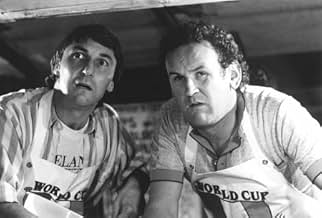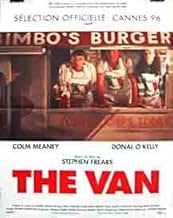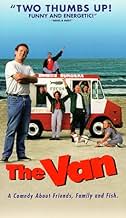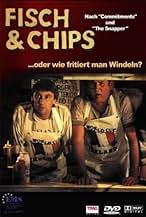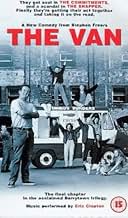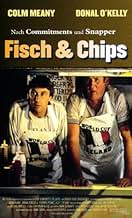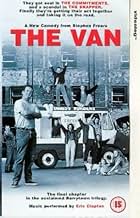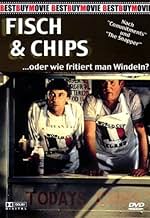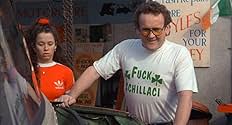Set in the fictional Dublin suburb of Barrytown, Bimbo is a baker who loses his job after being made redundant. Bimbo then acquires the help of his best friend, Larry, to set up a successful... Read allSet in the fictional Dublin suburb of Barrytown, Bimbo is a baker who loses his job after being made redundant. Bimbo then acquires the help of his best friend, Larry, to set up a successful burger van.Set in the fictional Dublin suburb of Barrytown, Bimbo is a baker who loses his job after being made redundant. Bimbo then acquires the help of his best friend, Larry, to set up a successful burger van.
- Awards
- 1 nomination total
Featured reviews
"The Van" is one of very few novels that have made me laugh out loud, on numerous occasions, whilst reading it. Thus, I feared the movie couldn't possibly live up to the book and I was right.
The characters appear nowhere near as appealing as they do in the book -even the lead characters name has changed from Jimmy to Larry. In fact the Rabbite family has been drastically culled. The dialect can be difficult to catch at times (my wife mistook "World Peace" for "Wolf's p**s" during one pun). The "Living Dead" appear from nowhere and........no, I'm not doing any more comparisons.
If you want a good laugh read the book.
The characters appear nowhere near as appealing as they do in the book -even the lead characters name has changed from Jimmy to Larry. In fact the Rabbite family has been drastically culled. The dialect can be difficult to catch at times (my wife mistook "World Peace" for "Wolf's p**s" during one pun). The "Living Dead" appear from nowhere and........no, I'm not doing any more comparisons.
If you want a good laugh read the book.
OK, apparently, Colm Meaney (happy birthday, Colm!) is best known for a "Star Trek" role, but I always associate him with his roles in adaptations of Roddy Doyle novels. They are "The Commitments", "The Snapper" and "The Van". The last one casts as a down-on-his-luck Dubliner who with his friend finds a grimy abandoned van and opens it up. While I mostly liked the movie, it did have the problem of showing the Irish drinking and moping about life's travails; is that the only way to stereotype people from the Emerald Isle? But otherwise, I found it a pretty good look at working-class life in Ireland. Once again, Stephen Frears added another accomplishment to his resume, recently continued with "The Queen". I recommend it, and see whether or not you want to get a bite to eat from any random van after watching this.
When Brenda 'Bimbo' Reeves is laid off he finds himself on the dole and irking out a unfulfilling life with friend Larry. When a 'friend' sells them a clapped out old chip van Bimbo and Larry decide to make a go of it and, once they have removed an inch of grease from the van and worked out how to move it without an engine, they are in business. With the pubs crammed due to the 1990 World Cup, business looks great and, as Ireland continue to win their way through the tournament, things just look like getting better and better.
Being from Northern Ireland myself, I always find something to like in Doyle's very typical delivery and, as such, will always give the films adapted from his work a try. With The Van doing average business in the cinemas, I had to wait till it came onto television before I could get a chance to see it and it was as I expected, an enjoyable working-class fable of friendship set against the backdrop of unemployment. As such it is pretty good providing good humour throughout as well as a nice build of tension between the two friends. What I didn't think it did very well was deliver something beyond the boundaries the film had set itself. By this I mean I had expected that the film would be more realistic whereas it really was more of a fable with a moral about friendship over money; it is not a bad thing that it did this but the film could have been stronger with it in my opinion.
However, for what it tries to do it manages to be slight but amusing with a good little turn into the dramatic towards the end to set up the lesson for the day. The cast fit the bill for this type of material as well; Meaney may well have been in several big American hits but he is more at home here and he is a totally convincing working class Irish man. O'Kelly is just as good for different reasons he is the same class but one who thought he was out; maybe you need to have lived around these sorts of areas but I thought he was realistic enough. The two have good chemistry and the support cast are also good value.
Overall this is not the best of Doyle's films but it is an enjoyable little slice of Irish life albeit very simplified and served up in a sauce of cheerful poverty. The script doesn't go deeper than the superficial issues of friendship but this still work well enough and they produce an enjoyable little Irish fable that is amusing as it delivers a lesson about friendship that is thankfully free of sentimentality or slush.
Being from Northern Ireland myself, I always find something to like in Doyle's very typical delivery and, as such, will always give the films adapted from his work a try. With The Van doing average business in the cinemas, I had to wait till it came onto television before I could get a chance to see it and it was as I expected, an enjoyable working-class fable of friendship set against the backdrop of unemployment. As such it is pretty good providing good humour throughout as well as a nice build of tension between the two friends. What I didn't think it did very well was deliver something beyond the boundaries the film had set itself. By this I mean I had expected that the film would be more realistic whereas it really was more of a fable with a moral about friendship over money; it is not a bad thing that it did this but the film could have been stronger with it in my opinion.
However, for what it tries to do it manages to be slight but amusing with a good little turn into the dramatic towards the end to set up the lesson for the day. The cast fit the bill for this type of material as well; Meaney may well have been in several big American hits but he is more at home here and he is a totally convincing working class Irish man. O'Kelly is just as good for different reasons he is the same class but one who thought he was out; maybe you need to have lived around these sorts of areas but I thought he was realistic enough. The two have good chemistry and the support cast are also good value.
Overall this is not the best of Doyle's films but it is an enjoyable little slice of Irish life albeit very simplified and served up in a sauce of cheerful poverty. The script doesn't go deeper than the superficial issues of friendship but this still work well enough and they produce an enjoyable little Irish fable that is amusing as it delivers a lesson about friendship that is thankfully free of sentimentality or slush.
Booker prize winner Roddy Doyle , who started life as a school teacher in a depressed neighbourhood in Dublin, the capital of Ireland, offers us a vivid yet humorous slice of life in Dublin at a pivotal time in contemporary Irish history. He tells this story from the perspective of down trodden families living in a depressed yet resilient neighbourhood. What is truly brilliant about this film is not just the hilarious storyline or the magical performances but how it captures the moment when Ireland as a nation got back on its feet and began to embrace Europe and world with renewed confidence. The story is set during the monumental moments of the European Football Championships of 1988, EURO'88 , when the Irish soccer team surprised Europe, and not least the Irish, with their success. It has been said that this event and the continued success of the Irish soccer team in Italia 90 sparked a renewed confidence within Ireland which greatly contributed to the success of the Irish economy in recent years, now known as the Celtic Tiger. The Barrytown trilogy written by Doyle has given us 3 memorable film adaptations in 'The Commitments'; 'The Snapper' and now this the final episode 'The Van'. Roddy Doyle went on to win the Booker prize for 'Paddy Clarke , ha, ha, ha' and is one of the foremost novelists active in Ireland today. His comedy and dialogue use the often thick Dublin working class dialect, which add to the lyrical nature of the scenes. Most of the characters are in turmoil due to their circumstances and the comedy lies in their posturing with each other in a dead-pan, black comedy.
It's November 1989. Bimbo (Donal O'Kelly) is fired from the bakery. His best mate Larry (Colm Meaney) is struggling with only welfare for the coming Christmas. Bimbo is about to consider a MacDonald McJob when the guys are shown a food van. It's a piece of junk that doesn't even have an engine. Bimbo's wife buys the van and he invites Larry to join him selling fish and chips. Their chips van does smashingly as Ireland advances in the World Cup.
It's a steady decline from 'The Commitments' to 'The Snapper' and then to this. A more direct connection would have been better but I'm not an entertainment lawyer. It's still a fun watch. Donal O'Kelly doesn't have the screen presence. Colm Meaney is back and he overshadows everybody else. The trick is to make these poor losers lovable. Colm Meaney has that in spades. It would be better for them to get a steady young kid as their third. The relationship in the van is where this movie could have excel more. The guys' friendship could be more likable. I especially didn't like them picking up the ladies at the bar. Even their bickering could have been done with a lighter touch. Nevertheless it's still a fun ride.
It's a steady decline from 'The Commitments' to 'The Snapper' and then to this. A more direct connection would have been better but I'm not an entertainment lawyer. It's still a fun watch. Donal O'Kelly doesn't have the screen presence. Colm Meaney is back and he overshadows everybody else. The trick is to make these poor losers lovable. Colm Meaney has that in spades. It would be better for them to get a steady young kid as their third. The relationship in the van is where this movie could have excel more. The guys' friendship could be more likable. I especially didn't like them picking up the ladies at the bar. Even their bickering could have been done with a lighter touch. Nevertheless it's still a fun ride.
Did you know
- TriviaThis is the third story in Roddy Doyle's "Barrytown Trilogy", following the adventures of the Rabbitte family. However, as 20th Century Fox owned the film rights to the Rabbitte name (from The Commitments), the characters had to be re-named in the subsequent film adaptations (The Snapper, The Van).
- GoofsThe movie is set during World Cup 1990, and on at least two occasions, the radio can be heard promoting 98FM. This station did not use this branding until the mid 1990s; it was called Classic Hits at the time.
- Alternate versionsIn the UK in 2007 a re-edited version was passed for certification for video release by the BBFC running at 92 minutes 50 seconds, some 3 minutes 55 seconds shorter than the normal theatrical version.
- SoundtracksWand'rin' Star
Words by Alan Jay Lerner
Music by Frederick Loewe
© Alan Jay Lerner/Frederick Loewe/Chappell & Co Inc
By Kind Permission of Warner Chappell Music Limited
- How long is The Van?Powered by Alexa
Details
- Release date
- Countries of origin
- Official site
- Language
- Also known as
- La camioneta
- Filming locations
- Production companies
- See more company credits at IMDbPro
Box office
- Gross US & Canada
- $712,095
- Opening weekend US & Canada
- $23,366
- May 18, 1997
- Gross worldwide
- $714,197
- Runtime
- 1h 40m(100 min)
- Color
- Sound mix
- Aspect ratio
- 1.85 : 1
Contribute to this page
Suggest an edit or add missing content


